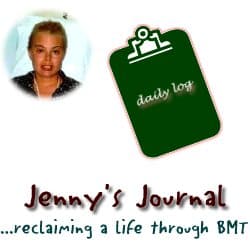

From: “Smith, Dianne” Dianne.Smith@mpls.frb.org
We’re finding out that a bone marrow transplant is different from most other medical procedures. You don’t just slowly get better as time passes, it is more like a rollercoaster ride with many ups and downs.
Jenny began to get weak and lethargic on July 18th. At clinic the following day, it was determined that her magnesium and hemoglobin were too low. She received 2 units of blood, a bag of platelets and an IV of magnesium. The next few days she was a little better, but not as alert and strong as she was when we left the hospital. She got weaker with each passing day. She was having difficulty walking, she couldn’t stand still without her knees buckling and her fingers were so weak she couldn’t squeeze the toothpaste out of the tube. We were getting very worried.
We found out that Jenny had a cytomegalovirus (CMV) flare up and she had fluid in her left lung. CMV is a virus that causes upper respiratory infections. Once you’ve had it, you’re CMV+ and it remains in your system for the rest of your life . It is dormant until it finds an opportunity (like a suppressed immune system). This was a setback and meant that Jenny would receive gancyclovir twice a day in an IV at home. The gancylcovir consequently has caused her to have a fever for the past 3 days. She continues to be quite tired and “foggy” as a result, but the CMV is at bay.
The most recent setback caught us off-guard completely. On Saturday evening and again last night, Jenny experienced amnesia for approximately 2-3 minutes. She didn’t know what year it was, what our address is, what her brother’s name is, why she had a hickman catheter coming out of her chest; nothing. She was terrified. Fortunately, it subsided in a few mintes. The doctors have determined that the cyclosporine (CSA), an anti-rejection drug, is the culprit. It causes brain toxicity in some people, the neurological damage should reverse after the CSA is discontinued. At this time, we’re under the impression that she’ll have to take the CSA for 6-7 months post-transplant. One of us is with her at all times, even when she sleeps.
Jenny’s current chest x-ray shows that the fluid is gone from her lung. Today, she seemed a little stronger and a little more alert, although she is still slept almost 18 hours today.
There can be so many complications with a bone marrow transplant, it is truly the most invasion treatment used in medicine today. We’ve been fortunate that each setback has been a mild case and there has been a prompt and positive solution.
I look at Jenny so many times in a day and I think about her positive attitude, diligence, persistence and courage. She truly is a most remarkable person.
Until next time, keep us in your prayers.
The Smiths
Steve, Dianne, Jenny and Jason
